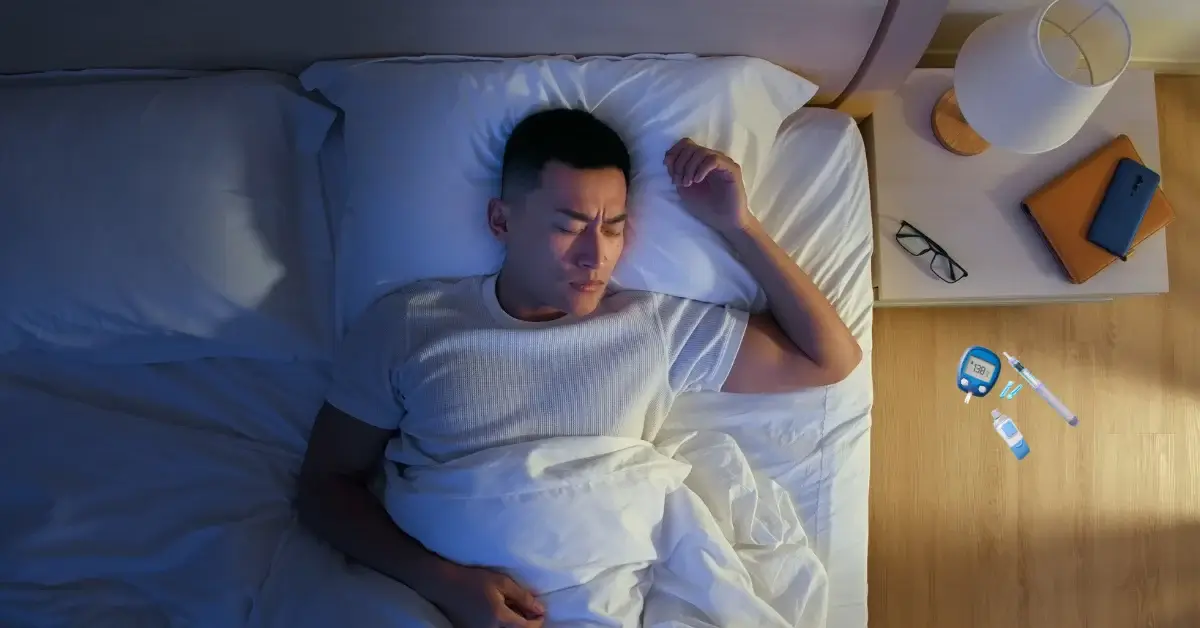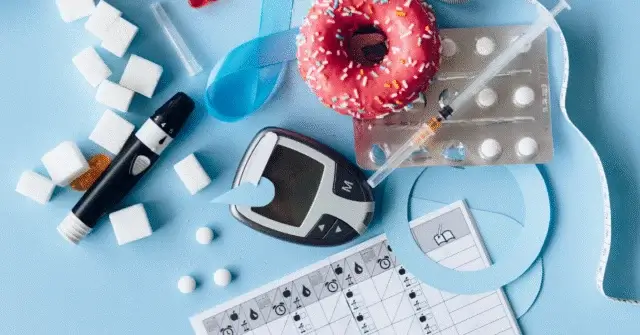Let’s be real — Living with diabetes can be exhausting, but what most people don’t realize is how silently it affects your nights too. Diabetes is stealing your sleep—and you might not even know it. From midnight bathroom trips to burning feet and blood sugar crashes, it creates a restless loop that leaves you drained every morning.
I’ve been there. Lying in bed at 3 AM, eyes wide open, legs twitching, and making my fourth trip to the bathroom. All while knowing I’ve got work in the morning and my sugar will likely be through the roof by sunrise.
Sound familiar? If you often wake up tired and cranky, chances are that diabetes is stealing your sleep.
If you’re diabetic and struggling with sleep, you’re not alone—and it’s not in your head. The connection between diabetes and poor sleep is real, backed by research, and sadly, often overlooked in treatment plans. The good news? You don’t have to stay stuck in this cycle.
How Diabetes Is Stealing Your Sleep and Why It Matters
Diabetes affects nearly every system in your body—and yes, that includes your sleep-wake cycle.
When your blood sugar is too high or too low, it disrupts your body’s natural rhythm. Your kidneys kick into overdrive, your nerves start acting up, and your breathing may even become irregular during the night. Add stress and hormonal changes to the mix, and you’ve got a recipe for sleepless nights.
At the same time, poor sleep makes it harder for your body to manage blood sugar. You wake up tired, reach for carbs for quick energy, and your insulin resistance increases—making your numbers worse the next day. Many people with Type 2 diabetes don’t realize that their condition is stealing their sleep in subtle ways.
It’s a vicious loop: bad sleep → worse sugar → worse sleep → repeat.
Common Sleep Disturbances in Diabetics
Nocturia – The Urge That Won’t Let You Sleep
One of the most frustrating parts of diabetes is frequent nighttime urination. You didn’t drink much water, yet your bladder feels full every two hours. That’s because your kidneys are trying to flush out excess glucose by producing more urine.
Studies, including one in Diabetes Care, show that over 40% of people with diabetes experience nocturia regularly. Even mildly high blood sugar at bedtime (above 140 mg/dL) can trigger this response.
Quick Fixes:
- Cut fluids 1.5 hours before bed (yes, even green tea).
- Eat a lighter, lower-carb dinner.
- Test your sugar before sleeping and correct mild highs if needed.
Neuropathy – The Nighttime Burning and Tingling
Neuropathy pain is cruel—it loves the night. During the day, you’re busy and distracted. But at night, when the world quiets down, the nerve tingling, burning, or stabbing becomes impossible to ignore.
This happens because damaged nerves send confused signals when you’re at rest. Your body isn’t moving, but your nerves act like there’s danger. This pain, even if mild, can make falling or staying asleep feel impossible.
What Helps:
- Warm foot soak with Epsom salt.
- Coconut oil + peppermint oil massage (cooling + calming effect).
- Keeping legs elevated slightly with a pillow improves circulation.
A study from the Journal of Clinical Sleep Medicine confirms that 60% of diabetics with neuropathy suffer from sleep disturbances.
Sleep Apnea – A Hidden Enemy for Diabetics
You may think snoring is just annoying for your partner, but for diabetics, it could be a big red flag. Sleep apnea, particularly obstructive sleep apnea (OSA), is often seen in people with Type 2 diabetes — especially individuals with a higher body weight.
Sleep apnea causes you to stop breathing momentarily during the night. This drops oxygen levels, spikes cortisol (stress hormone), and increases insulin resistance. The result? You wake up groggy, with no clue why your blood sugar’s a mess.
Red Flags to Watch:
- Loud snoring
- Gasping or choking while asleep
- Waking up tired despite 7–8 hours in bed
If you suspect apnea, ask your doctor about a home sleep study. Many labs now offer affordable, non-invasive tests you can do in your own bed.
When Diabetes Steals Your Sleep, Your Blood Sugar Fights Back
Hormonal Imbalance
Lack of sleep ramps up cortisol, which directly causes higher fasting blood sugar in the morning. Even if you ate clean the night before, you’ll wake up with a sugar reading that makes no sense.
Increased Insulin Resistance
Your body becomes significantly less responsive to insulin after poor sleep. One study found a 40% drop in insulin sensitivity after just one bad night.
Appetite Changes
Sleep deprivation increases ghrelin (the hunger hormone) and decreases leptin (the satiety hormone). So you find yourself reaching for extra carbs and snacks throughout the day, often without even noticing.
The Sleep-Diabetes Spiral: A Two-Way Street
The most important thing to understand is that diabetes and sleep aren’t separate issues—they affect each other. You can’t treat one without addressing the other.
If you keep focusing only on diet and insulin while ignoring sleep, you’re only solving half the problem. It’s like trying to clean one side of a dirty window and wondering why the view’s still blurry.
How I Broke the Cycle – A Personal Healing Journey
For years, I chased better sugar numbers by obsessing over what I ate and how much I moved. Sleep? It was never even on my radar. Until things got so bad that I couldn’t function during the day—I was cranky, groggy, and constantly hungry. And my fasting sugar? Always high, no matter what. What can you do when diabetes is stealing your sleep night after night?
I decided to change one thing at a time.
I started by simply turning off screens an hour before bed and soaking my feet in warm water. Then I added light dinners—moong dal cheela instead of rice or roti. Slowly, I noticed a shift. I woke up fewer times. My nerves hurt less. And the biggest surprise? My blood sugar dropped 15–20 points overnight.
It wasn’t magic. It was sleep.
Also Read: Can Drinking Apple Cider Vinegar Help with Diabetes?
Solutions Backed by Experience and Science
There are real, science-backed ways to fight back when diabetes is stealing your sleep. Let’s talk practical changes—things you can start doing tonight to improve your sleep and stabilize your blood sugar.
Adjust Your Evening Meal for Stable Sleep
Why it works: Heavy, high-carb meals at night raise blood sugar and trigger nocturia. A slow, steady glucose curve supports restful sleep.
Try This Instead:
- Moong dal chilla with sautéed spinach
- Methi roti with lauki sabzi
- Palak soup with grilled paneer cubes
Pro Tip: Finish dinner by 8 PM, allowing 2–3 hours before bed for digestion and glucose regulation.
Neuropathy Management Before Bedtime
What You Can Do:
- Fill a small tub with warm water and add a spoon of Epsom salt.
- Soak your feet for 10–15 minutes. This eases inflammation and relaxes the nerves.
- Dry thoroughly and massage with coconut oil mixed with a drop of peppermint oil.
- Elevate your feet slightly with a rolled towel or pillow under your knees.
This simple ritual not only relaxes your legs but also signals your brain that it’s time to wind down.
Addressing Snoring and Suspected Apnea
If your partner complains about your snoring or if you often wake up tired, don’t brush it off.
What You Should Know:
- Apnea causes disrupted sleep and stress on your cardiovascular system.
- Untreated, it worsens insulin resistance over time.
What You Can Do:
- Sleep on your side (left side preferred for heart health and open airways).
- Prop up your head slightly with two pillows or an inclined wedge pillow.
- Schedule a home sleep test—it’s easier and more comfortable than lab studies.
Even losing 5–10% of your body weight can drastically reduce apnea episodes.
Tackling Hypoglycemia During Sleep
Some diabetics experience nighttime lows and don’t realize it. They wake up sweaty, shaky, or disoriented.
Use the 15-15 Rule:
- Keep a small snack by your bed—like 1 tbsp peanut butter + 1 date or a glucose tablet.
- If you wake with low sugar (<70 mg/dL), consume it and test again after 15 minutes.
Prevention Tip: Avoid insulin overcorrection in the evening and include a protein-fat combo (like paneer or peanut butter) in your last meal to maintain stability overnight.
Creating a Healthy Bedtime Routine
You don’t need a 2-hour spa routine. Just consistent, calming habits that signal your body it’s time to sleep.
Try This Wind-Down Routine:
- Dim the lights 1 hour before bed.
- Shut down all screens (mobiles, TV, tablets).
- Put on soft instrumental or devotional music (like bhajans or flute).
- Do 5–7 minutes of deep breathing or light stretching.
- Write down one positive thing about your day in a journal.
Exploring Natural Sleep Aids Safely
Before jumping into pills, let’s look at safe, natural options—especially important for diabetics.
Herbal Teas That Help
- Chamomile: Reduces anxiety and promotes relaxation.
- Ashwagandha: Balances cortisol and supports a calm nervous system.
- Tulsi (Holy Basil): Acts as an adaptogen and improves sleep quality.
Tip: Avoid sugar in your bedtime tea—opt for a pinch of cinnamon or cardamom instead.
Magnesium and Melatonin – Worth Trying?
- Magnesium (Glycinate or Citrate): Helps with leg cramps and nerve function.
- Melatonin (1–3 mg): Safe for short-term use but always consult your doctor first, especially if you’re on medication.
Inspiring Success Stories
“I started by simply moving my dinner earlier. Within a week, my blood sugar dropped by 20 points in the morning. I also stopped waking up to pee 3–4 times.”
— Anjali Mehra, Bengaluru
“My neuropathy was ruining my sleep. Coconut oil massages felt silly at first, but now I swear by them. My feet don’t burn anymore at night.”
— Ravi Deshmukh, Pune
“I thought snoring was normal. But after a sleep study, I was diagnosed with apnea. The CPAP machine changed my life. I’m rested, and my sugar levels are finally in control.”
— Sunil T., Delhi
Reclaiming Rest: How to Stop Diabetes from Stealing Your Sleep
You’ve probably been told that food and exercise are the pillars of diabetes management. That’s true—but sleep is the foundation that holds those pillars upright.
When your sleep improves, so does your decision-making, your mood, and your body’s ability to regulate glucose. It’s not a luxury—it’s medicine.
Start tonight. You don’t need to do everything at once. Just pick one small change and stick to it. Whether it’s skipping that evening chai, soaking your feet, or turning off your phone 30 minutes early—every effort counts.
Sleep is free. It’s powerful. And it might just be the missing piece in your diabetes journey.
FAQs
Absolutely. Good sleep reduces cortisol, improves insulin sensitivity, and helps your body balance hunger hormones—making it easier to control sugar levels.
The most common issues are nocturia (frequent urination), neuropathy-related discomfort, and obstructive sleep apnea. These can all significantly disrupt sleep quality.
Yes. Persistent morning fatigue, despite enough sleep time, could signal sleep apnea or nighttime blood sugar fluctuations. It’s worth discussing with your doctor.
Not always, but loud, chronic snoring combined with gasping, choking, or excessive daytime sleepiness is a strong indicator of sleep apnea. A sleep study can confirm it.
Keep it simple: eat light and early, avoid screens before bed, soak your feet if you have neuropathy, and wind down with calming music or breathing exercises. Consistency is key.
Your turn now. Pick one tip from above and try it tonight. Small changes add up. Please don’t forget to leave your experiences.




